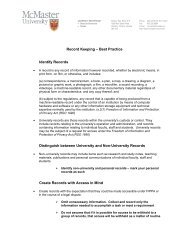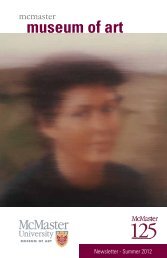Pilgrimage: A Paradigm for Spiritual Formation - McMaster University
Pilgrimage: A Paradigm for Spiritual Formation - McMaster University
Pilgrimage: A Paradigm for Spiritual Formation - McMaster University
You also want an ePaper? Increase the reach of your titles
YUMPU automatically turns print PDFs into web optimized ePapers that Google loves.
ADNAMS <strong>Pilgrimage</strong><br />
159<br />
In addition to Hudson’s ideas, there are other creative ways to<br />
live out pilgrimage as a paradigm <strong>for</strong> spiritual <strong>for</strong>mation that<br />
could help churches become acquainted with the concept. Those<br />
who have already adopted this paradigm could use pilgrim<br />
language in daily conversation and/or through in<strong>for</strong>mal book<br />
studies of Pilgrim’s Progress or The Way of a Pilgrim. Retreat<br />
settings would be ideal <strong>for</strong> presenting the pilgrimage paradigm.<br />
Sunday morning contexts of teaching, preaching, hymns and<br />
spiritual songs/choruses, and visuals, could introduce the pilgrimage<br />
motif in a variety of ways. Churches that follow the<br />
seasons of the liturgical year have a traditional Christian<br />
framework <strong>for</strong> incorporating the pilgrimage paradigm into the<br />
life of the congregation. The possibilities are numerous.<br />
Evaluating the <strong>Pilgrimage</strong> <strong>Paradigm</strong><br />
Although this paper has developed a paradigm of pilgrimage <strong>for</strong><br />
spiritual <strong>for</strong>mation, and Trevor Hudson powerfully demonstrates<br />
how it can be implemented, does this paradigm actually fit the<br />
basic criteria that were laid out earlier <strong>for</strong> a spiritual <strong>for</strong>mation<br />
paradigm? Returning to those requirements, we are reminded<br />
that as spiritual <strong>for</strong>mation falls under the discipline of Pastoral<br />
Theology, developing a paradigm <strong>for</strong> spiritual <strong>for</strong>mation must<br />
engage with culture, Scripture and Christian tradition, and<br />
personal experience. This pilgrimage paradigm has done so.<br />
Moreover, by adopting the concept of pilgrimage, the paradigm<br />
has provided an ancient, but fresh way of viewing and encouraging<br />
spiritual <strong>for</strong>mation with language that challenges<br />
settled assumptions of faith. For some Canadian Christians,<br />
receiving Jesus Christ into their hearts as Lord and Savior is a<br />
secure ticket to heaven and a guarantee against suffering; the<br />
“already” is here and thus suffering is no longer part of this<br />
earthly life. The pilgrimage paradigm challenges those assumptions<br />
by showing that spiritual <strong>for</strong>mation is ongoing throughout<br />
the life pilgrimage, and that it does indeed entail suffering.<br />
Accordingly, the paradigm respects and validates the complexities<br />
and ambiguities of individual and corporate lives that call<br />
<strong>for</strong> nuanced approaches to discipleship rather than systematic
















